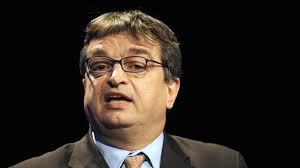By Andrew Warshaw, chief correspondent
January 20 – The first battle lines in the bid to become the next president of FIFA were drawn today when Jerome Champagne, one of the organisation’s most senior former administrators, officially announced his intention to run for the top job in world football.
“We need a different FIFA,” said Champagne, releasing his on-line manifesto 16 months before next year’s late-May election. “More democratic, more respected, which behaves better and does more, adjusting more to the realities of the world. It’s fundamental to redress the imbalances in the game. If we continue this elitisation, where are we going to end?”
But Champagne, a former French diplomat, was non-committal – much to frustration of the attending media – on whether he would still stand if he ends up opposing the present incumbent, Sepp Blatter.
“I don’t know what he will do, at the moment I am the only candidate,” said Champagne, somewhat cryptically. “I will decide at the right moment. I’m here because I’ m seriously committed. I’m running because I want to implement my ideas, not just to fall down.”
Yet asked specifically whether he thought he could beat Blatter, he replied: “No I don’t think so but it’s a hypothetical question. I certainly don’t fear Mr. Blatter.”
Blatter, who will be 78 in March and who has been at the helm since 1998, has given countless hints in the past few months that he might change his mind and go for one final four-year term after initially saying he would step down.
The smart betting on the leadership contest would be for Blatter to run for another term and for UEFA boss Michel Platini – widely viewed as the only viable candidate who has declared an ambition for the post – to pull out of the reckoning. It is hard to see Champagne winning in a run-off with Blatter. Indeed, it is hard to see anyone winning against him currently .
The suave, multi-lingual Champagne, 55, was both FIFA’s director of international relations and deputy general secretary under Blatter but was spectacularly ousted in 2010 for allegedly overstepping the mark in his dealings with national federations.
After 11 years at FIFA, he has since been networking behind the scenes, setting himself up as a consultant for a number of footballing territories eager to be recognised as part of the football family, notably Palestine – now a full FIFA member – northern Cyprus and Kosovo.
With a raft of ideas for revolutionising FIFA and getting rid of some of its bureaucracy, he sees himself as the modern reformer to take the organisation forward. In 2012 he issued a detailed 26-page discussion document entitled ‘What FIFA for the 21st Century?’ arguing for stronger measures to streamline the FIFA executive. But his self-funded candidature with no apparent campaign team behind him – a move designed to maintain transparency and not leave him open to any allegations of wrongdoing – will nevertheless be viewed very much as a left-field move from a man who has remained, publicly at least, on the outside of football politics in recent years.
Blatter still commands a huge body of support among FIFA member associations and says he will make a definitive decision whether to stand some time before this June’s FIFA Congress that precedes the World Cup. Platini says he will wait until after the tournament.
Whether Champagne can fulfil two key criteria is crucial. Under new FIFA rules approved last year as part of its reform process, any candidate for the office of president is only valid “if supported by a total of at least five member associations”.
Just as significantly, all candidates “must have played an active role in association football for two of the last five years.”
Champagne, who has informed all FIFA’s 209 member countries of his intention to stand, wouldn’t reveal which five federations had agreed to back him. Such details, he said, would be revealed later in his campaign but no later than January next year. As for the second of the two criteria, he said he was absolutely certain that he qualified since he knew the revised regulations for candidates “inside out”.
Brazil legend Pele, a three-time World Cup winner, emerged as the first major footballing icon to support Champagne’s campaign. “I cannot stay away from a debate which is so important for the future of football and thus, I support Jerome Champagne and his vision,” Pele said in a videotape message.
With or without Pele’s support, Champagne will be a rank outsider – even though many fans might agree with some of his proposals for restructuring power at the top of the world game, reducing the influence of the six confederations and putting direct representatives of leagues, clubs and players on to the FIFA executive. It is not likely to be a vote winner.
Contact the writer of this story at moc.l1745191957labto1745191957ofdlr1745191957owedi1745191957sni@w1745191957ahsra1745191957w.wer1745191957dna1745191957

